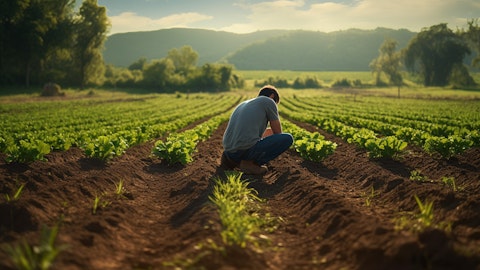Arcadia Biosciences, Inc. (NASDAQ:RKDA) Q3 2024 Earnings Call Transcript November 12, 2024
Operator: Good afternoon, and welcome to Arcadia Biosciences Third Quarter 2024 Financial Results and Business Highlights Conference Call. At this time all, participants are in a listen-only mode. After the speakers’ presentation, there will be a question-and-answer session. [Operator Instructions] Please be advised that, today’s conference is being recorded. I would now like to hand the conference over to Mark Kawakami, Chief Financial Officer at Arcadia. Please go ahead.
Mark Kawakami: Thank you, and good afternoon. Joining me on the call today is T.J. Schaefer, Arcadia’s President and Chief Executive Officer. This call is being webcast, and you can refer to the company’s press release at arcadiabio.com. Before we start, we would like to remind you that Arcadia Biosciences will be making forward-looking statements on this call based on current expectations and currently available information. However, since these statements are based on factors that involve risks and uncertainties, the company’s actual performance and results may differ materially from those described or implied today. You can review the company’s safe harbor language in our most recently filed 10-Q. With that, I’ll now turn the call over to T.J.
T.J. Schaefer: Good afternoon, and thank you to everyone on the call for joining us today to discuss our 2024 third quarter financial results. When we last spoke in August, we characterized the second quarter of 2024 as a turning point for Arcadia as it relates to our business transformation that has taken shape over the last two years. And I believe our third quarter results exemplify the plan we have put in place as well as our ability to execute on it. First, in the third quarter, our total revenues increased 18% year-over-year, driven by a 55% increase in Zola Coconut Water sales, which I will discuss in more detail later in my prepared remarks. Second, at the same time, we grew the top line, we maintained our selling, general and administrative expenses.
While SG&A expenses increased by $380,000 compared to last year, the entire variance was driven by severance and transition-related fees following the sale of GoodWheat. And finally, our use of cash during the quarter declined to $1.5 million, and that number includes more than $400,000 related to discontinued operations. To put that in perspective, this is the lowest level of cash used in a quarter since Arcadia went public. So we are extremely pleased with the progress that has been made thus far, but our work is not done. While we continue to evaluate strategic alternatives, we are focused on reducing our cost structure, including both cost of goods sold and operating expenses, monetizing our existing Wheat portfolio and growing our Zola Coconut Water business, which is off to an amazing start.
In Q3 2024, Zola revenues increased 55% compared to the same period last year driven by new distribution added during the quarter, strong orders from our existing customers and the new items that started shipping last quarter. The general health of the coconut water industry also contributed to Zola’s growth. From a distribution perspective, Zola retail store count increased 68% compared to the same period last year, resulting in the largest quarterly rate of distribution gains in our company’s history. But Zola growth was not just driven by winning new customers. In fact, while our revenues, which represent the sell-in to the retailer or distributor, increased 55% year-over-year, our sell-through, as measured by scan data, increased more than 36% compared to prior year, showing strong end customer demand for our products.
To drive home that point even further, let me give you an example that illustrates the existing customer demand for Zola. In July 2024, Zola experienced its highest month of sales since Arcadia acquired the brand in May 2021. This performance was almost entirely driven by strong orders from our existing customer base, as 95% of the new distribution in Q3 did not start shipping until the end of the quarter. Another factor that contributed to Zola’s growth during the quarter was our Q2 launch of new items. As a reminder, the new items included our original, lime and pineapple flavors in a new 16.9-ounce tetra pack, and these SKUs have been incremental to the to the Zola’s at as opposed cannibalizing existing sales. The last driver of growth for Zola is health of the category in which it competes.
The coconut water industry continues to perform well, as consumers look for health benefits, such as hydration and electrolytes from their beverages. A healthy industry landscape is vital for growth. But importantly, according to the Nielsen data ending on September 28, 2024, Zola grew faster than the category across all measured time periods. More specifically, if we look at the last 52 weeks, the coconut water category grew 15%, while Zola grew 23%. During the latest 13 weeks, essentially representing the quarter, the category rose 20%, while Zola scan data increased by 36%. And finally, in the latest four-week period, which represents the month of September, the coconut water industry grew 28%, while Zola increased 73%, primarily due to the new distribution that began shipping towards the end of the quarter, as I previously mentioned.
So from an operating perspective, we are extremely pleased with our performance as well as our ability to lay out a plan and deliver what we said as revenues increased at a double-digit rate, and our cash burn is at historic lows. Let me now shift gears and talk about what lies ahead for Zola. As we approach the end of the year, we remain optimistic. While Q4 is seasonally the softest quarter of the year for the entire coconut water industry, Zola has strong momentum heading into the end of the year with the significant amount of new distribution we added earlier in the year. In addition, we will begin shipping to two new customers in Q4 and we now expect our full year 2024 retail distribution growth to exceed 80%. We also continue to work on new innovation, which we spoke about briefly on the last earnings call.

While we will not be providing any specifics until we are closer to launch, here is what we can share. We have decided on the new concept, the product formulation is done, a mockup of the packaging is complete, and the SKUs we intend to launch have been identified. The next step in the process will be to test the concept and product samples with new and existing retailers to ensure we have interest ahead of our first production run as we will not invest in a new product launch until we understand customer uptake for the product. And in terms of timing, we expect to have the new product ready for beverage season next year. Before I conclude my prepared remarks, I wanted to let you know that we will not be providing any additional forward-looking guidance on the call today.
As I mentioned earlier, we added a tremendous amount of new distribution in Q3. The number of stores added during the quarter alone represents one-third of Zola’s total retail distribution and approximately 95% did not start shipping until the end of the quarter. This makes forecast accuracy extremely challenging as the initial sell-in to a new customer to add inventory to all of their distribution centers can be very different from the ongoing reorder patterns that emerge after the initial order is fulfilled. So, it’s really the size of the distribution gains, the percent of total Zola distribution that it accounts for, as well as the timing of the initial shipments that in combination caused us to be reluctant to provide any forward-looking numbers.
While we recognize the fact that this does cause some degree of uncertainty, I want to reiterate that these are all very good problems to have, so we appreciate your understanding. With that, I will now turn the call over to Mark to discuss our Q3 and year-to-date financial results. Mark?
Mark Kawakami: Thank you, T.J. and welcome to everyone joining us on the call. I would like to remind everyone that my discussion of the financial results will refer to the impact of continuing operations only. Any reference to prior year results will exclude the impact of the discontinued GoodWheat and Body Care operations. With that, I will begin our discussion of the financial results. In Q3, total revenues were approximately $1.5 million, and this represents an increase of 18% compared to the same period last year. This was driven by a strong performance for Zola, which increased 55% compared to Q3 of last year. This quarter, Zola represented about 86% of total revenues. As a reminder, sales of GLA oil have continued to decline as we sell through the last remaining inventory, and this quarter, sales were about half of what they were in Q3 of last year.
As T.J. mentioned, Zola has closed out the very busy summer season with a strong finish, and we are seeing uplift from the new distribution that we secured in Q2 as well as growth from our existing portfolio of customers. The cost of revenues in Q3 was approximately $1 million, and that included a write-down of just over $150,000 related to hemp and GoodWheat seed. Including the write-down, the total cost of revenues increased by about $200,000 or 26% compared to last year. Research and development costs were $24,000 in Q3. This was an increase of $9,000 compared to Q3 of last year, but it was a decrease of $15,000 year-to-date compared to last year. Selling, general and administrative costs in Q3 were approximately $2.2 million, and that included about $380,000 of transition costs related to the sale of GoodWheat assets.
These transition costs made up the entire variance to Q3 of last year, and they represented a 20% increase in cost. The loss from discontinued operations was $430,000 approximately three quarters of this was termination costs and fees for the remaining employees and vendors that supported the GoodWheat business. Overall, losses from discontinued operations decreased by 77% compared to the same period last year and this year, Q3 makes up about 16% of the total year-to-date loss. Moving on to the balance sheet. We ended Q3 with $6.6 million of cash and short-term investments compared to $8.1 million at the end of Q2. This change of $1.5 million included the $430,000 of expenses related to discontinued operations. Additionally, this change of $1.5 million is consistent with our overall cash consumption of $3.5 million in the first half of the year.
We ended Q3 with an inventory balance of $835,000. This was a decrease of 15% from the end of Q2, reflecting the end of peak selling season for Zola. The promissory note we received from the sale of GoodWheat continues to accrue interest at the prime rate. We are scheduled to receive approximately $2.5 million of cash in May of 2025 as the first repayment of principal and interest. In conclusion, we have continued to make tremendous progress in all aspects of our financial performance this quarter. We achieved revenue growth from both our existing portfolio as well as from the new distribution we secured in Q2 that has allowed us to outpace the category and achieve our highest level of sales since acquiring the Zola business in 2021. We also managed to achieve this revenue growth while maintaining our ongoing expenses.
This along with our management of inventory and other working capital has enabled us to reduce our use of cash from ongoing operations to some of the lowest levels in our history as a public company. I will now turn the call over to the operator for questions.
Q&A Session
Follow Arcadia Biosciences Inc. (NASDAQ:RKDA)
Follow Arcadia Biosciences Inc. (NASDAQ:RKDA)
Receive real-time insider trading and news alerts
Operator: Thank you. [Operator Instructions] And our first question comes from Ben Klieve of Lake Street Capital Markets. Your line is open.
Ben Klieve : Hi. Thanks for taking for taking my questions and congratulations here on some nice momentum from Q2 to Q3. First, a clarifying question, Mark, in your prepared comments, you noted a $150,000 write-down. Did you say that, that was entirely within this quarter and associated with the legacy business? Did I hear that correctly?
Mark Kawakami: Yes. It was entirely in this quarter and as it related to both Hemp and GoodWheat seed.
Ben Klieve : Hemp and GoodWheat seed. Okay.
Mark Kawakami: Yes.
Ben Klieve : Okay. Perfect. Thank you. So then looking at gross margins, if you back out that $150,000 write-down and then and then strip out the GLA business here that’s going to be coming off the books. Is a — can you help give us some guideposts regarding your expectations on margins on a go-forward basis when you back out those two big ticket items?
T.J. Schaefer: Yeah, Ben. So if you back out those two items, I think you’re going to land right around 33%. I think if you recall, historically, our long-term outlook for Zola margins is — I think we’ve kind of communicated low to mid-30s, and so we’re kind of right in the middle of that range.
Ben Klieve: Okay. Perfect. And then the onetime items within OpEx that you flagged, do you expect any more of those residual items to come through in the fourth quarter? Or do you think that was really contained within the third quarter?
T.J. Schaefer: Yes. I mean I think for the most part, things related to severance and those types of issues we’re past that. And so we would expect anything related to that transaction to be pretty minimal.
Ben Klieve: Okay, great. And then one more for me, and I’ll get back in queue. Regarding this just really kind of torrid pace of growth that you have in Zola with new distributors, can you maybe talk about your confidence in the infrastructure at Arcadia to support this growth, both in terms of inventory levels, any kind of ERP-related dynamic that you have to support this growth? Do you feel comfortable that you guys are going to be able to execute growth of this magnitude here in the fourth quarter and going forward?
T.J. Schaefer: Yeah. So let me break it up into a couple of pieces. From kind of the “infrastructure side of things”, we do feel comfortable. Zola is a product that is manufactured in Thailand. We received a finished good at the port. And so it is a very asset light business model. You did touch on inventory. That is something we, along with many of our competitors are trying to manage. Lead times have gotten longer in this industry, and so we’re having to plan further ahead. And, obviously, the large orders that we shipped at the end of the quarter started to eat into our safety stock that we have. And so that’s — it’s something that we’re managing through. We’re balancing. And as we approach a softer season, we would look to rebuild some of that of that safety stock.
Ben Klieve: Okay. Very good. That also makes sense. Well, congratulations again on a really good quarter here. Thanks for taking my questions, and I’ll get back in the queue.
T.J. Schaefer: Great. Thank you.
Operator: Thank you. I’m showing no further questions at this time. I’d like to turn it back to T.J. Schaefer for closing remarks.
T.J. Schaefer: Thank you. In our view, our third quarter 2024 results represent the progress we have made in transforming Arcadia’s business as well as our ability to execute on the plan we laid out. Our total revenues increased 18% year-over-year, driven by very strong growth in Zola revenues of 55%. From a distribution perspective, Zola retail store count increased 68% year-over-year and Zola is growing faster than the coconut water category across all measured time periods resulting in market share gains. And finally, we have significantly reduced our use of operating cash to the lowest levels in Arcadia’s public history. So we are extremely pleased with our performance, and we thank you again for your continued interest in Arcadia.
Operator: This concludes today’s conference call. Thank you for participating, and you may now disconnect.
Follow Arcadia Biosciences Inc. (NASDAQ:RKDA)
Follow Arcadia Biosciences Inc. (NASDAQ:RKDA)
Receive real-time insider trading and news alerts





